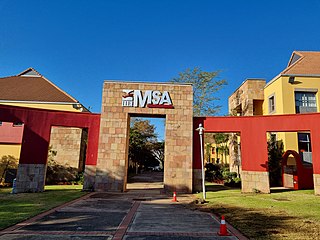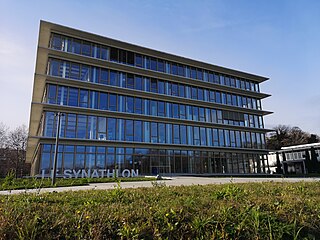
Postgraduate education, graduate education, or graduate school consists of academic or professional degrees, certificates, diplomas, or other qualifications usually pursued by post-secondary students who have earned an undergraduate (bachelor's) degree.
An academic degree is a qualification awarded to a student upon successful completion of a course of study in higher education, usually at a college or university. These institutions often offer degrees at various levels, usually divided into undergraduate and postgraduate degrees. The most common undergraduate degree is the bachelor's degree, although some educational systems offer lower-level undergraduate degrees such as associate and foundation degrees. Common postgraduate degrees include engineer's degrees, master's degrees and doctorates.

A master's degree is a postgraduate academic degree awarded by universities or colleges upon completion of a course of study demonstrating mastery or a high-order overview of a specific field of study or area of professional practice. A master's degree normally requires previous study at the bachelor's level, either as a separate degree or as part of an integrated course. Within the area studied, master's graduates are expected to possess advanced knowledge of a specialized body of theoretical and applied topics; high order skills in analysis, critical evaluation, or professional application; and the ability to solve complex problems and think rigorously and independently.
A bachelor's degree or baccalaureate is an undergraduate degree awarded by colleges and universities upon completion of a course of study lasting three to six years. The two most common bachelor's degrees are the Bachelor of Arts (BA) and the Bachelor of Science. In some institutions and educational systems, certain bachelor's degrees can only be taken as graduate or postgraduate educations after a first degree has been completed, although more commonly the successful completion of a bachelor's degree is a prerequisite for further courses such as a master's or a doctorate.

A Master of Science is a master's degree. In contrast to the Master of Arts degree, the Master of Science degree is typically granted for studies in sciences, engineering and medicine and is usually for programs that are more focused on scientific and mathematical subjects; however, different universities have different conventions and may also offer the degree for fields typically considered within the humanities and social sciences. While it ultimately depends upon the specific program, earning a Master of Science degree typically includes writing a thesis.
Degree abbreviations are used as an alternative way to specify an academic degree instead of spelling out the title in full, such as in reference books such as Who's Who and on business cards. Many degree titles have more than one possible abbreviation, with the abbreviation used varying between different universities. In the UK it is normal not to punctuate abbreviations for degrees with full stops, although this is done at some universities.

The Bologna Process is a series of ministerial meetings and agreements between European countries to ensure comparability in the standards and quality of higher-education qualifications. The process has created the European Higher Education Area under the Lisbon Recognition Convention. It is named after the University of Bologna, where the Bologna declaration was signed by education ministers from 29 European countries in 1999. The process was opened to other countries in the European Cultural Convention of the Council of Europe, and government meetings have been held in Prague (2001), Berlin (2003), Bergen (2005), London (2007), Leuven (2009), Budapest-Vienna (2010), Bucharest (2012), Yerevan (2015), Paris (2018), and Rome (2020).
A Master of Engineering is a professional master's degree in the field of engineering.
A Master of Advanced Studies, or Master of Advanced Study, is a postgraduate degree awarded in various countries. Master of Advanced Studies programs may be non-consecutive programs tailored for "specific groups of working professionals with well-defined needs for advanced degree work" or advanced research degrees. With the exception of the several schools in the UK, advanced studies programs tend to be interdisciplinary and tend to be focused toward meeting the needs of professionals rather than academics. The Master of Advanced Studies is also often referred as Executive Master because it is aimed at working professionals

Education in Belgium is regulated and for the most part financed by one of the three communities: Flemish, French and German-speaking. Each community has its own school system, with small differences among them. The federal government plays a very small role: it decides directly the age for mandatory schooling and indirectly the financing of the communities.

The IIE MSA, formerly known as Monash South Africa, is a university located in Johannesburg, Gauteng, South Africa. The Managing Director at IIE MSA is currently Louise Wiseman.
The Master of Public Health (MPH), Master of Science in Public Health (MSPH), Master of Medical Science in Public Health (MMSPH) and the Doctor of Public Health (DrPH), International Masters for Health Leadership (IMHL) are interdisciplinary professional degrees awarded for studies in areas related to public health. The MPH degree focuses on public health practice, as opposed to research or teaching. Master of Public Health programs are available throughout the world in Schools of Public Health, Programs in Public Health, Medical Schools, and Schools of Public Affairs. MPH degrees, in addition to including a core curriculum, will usually also let students pursue a specialization in a specific field, such as epidemiology, biostatistics, or health management.
The Doctor of Health Administration (D.H.A.) is a doctoral degree focused with the development of theoretical knowledge in health administration and on the applied application of the said knowledge in the field of health administration. The D.H.A. requires significant coursework beyond the master's level and often requires a dissertation or capstone project that contributes to knowledge or practice.

The International Academy of Sport Science and Technology is a non-profit foundation based in Lausanne, Switzerland.

Engineering education is the activity of teaching knowledge and principles to the professional practice of engineering. It includes an initial education and(B.Engg.) or (M.Engg.), and any advanced education and specializations that follow. Engineering education is typically accompanied by additional postgraduate examinations and supervised training as the requirements for a professional engineering license. The length of education, and training to qualify as a basic professional engineer, is typically five years, with 15–20 years for an engineer who takes responsibility for major projects.
Master's degrees in Europe are the second cycle of the Bologna process, following on from undergraduate bachelor's degrees and preceding third cycle doctorates. Master's degrees typically take two years to complete, although the number of years varies between countries, and correspond to 60 – 120 ECTS credits. Within the European Higher Education Area, representing almost all countries in Europe, master's degrees are referenced to the Framework of Qualifications for the European Higher Education Area and national qualifications frameworks.
An executive master's degree, also known as a Master of Advanced Studies (MAS), is an advanced level of master's degree designed specially for mid-career executive professionals.
The Geneva Centre of Humanitarian Studies offers comprehensive and specialized postgraduate training programs for professionals active in the humanitarian sector. Initially a joint center of the University of Geneva and the Graduate Institute of International and Development Studies until September 2024, it has since become affiliated with the Department de santé et médecine communautaires of the Faculty of Medicine at the University of Geneva.
A master's degree in the United Kingdom is an academic degree awarded by universities or colleges in most cases upon completion of a course of study demonstrating mastery or a high-order overview of a specific field of study or area of professional practice.






